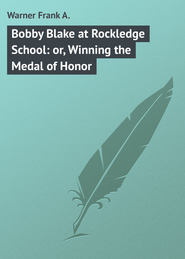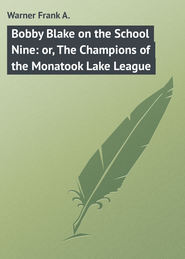По всем вопросам обращайтесь на: info@litportal.ru
(©) 2003-2024.
✖
Bobby Blake on a Plantation: or, Lost in the Great Swamp
Автор
Год написания книги
2017
Настройки чтения
Размер шрифта
Высота строк
Поля
“It wasn’t so bad,” he said complacently. “I don’t know how those things come to me but they do – just like that,” he added snapping his fingers airily.
“He hates himself – I don’t think,” remarked Fred, making a playful pass at Billy, who dodged so adroitly that the blow passed over his head and caught the luckless Pee Wee in the stomach almost making him drop his watch again.
“Say, what are you up to?” he demanded indignantly, rubbing the injured spot with his hand. “Haven’t I had hard luck enough for one day without you fellows rubbing it in?”
“You seem to be doing all the rubbing,” laughed Fred. “Sorry, old boy, but that stomach of yours is so big that nothing can miss it.”
“Stop picking on poor little Pee Wee,” chuckled Sparrow. “Cheer up, Pee Wee. What if another Ingersoll did bite the dust? You’ll have a good excuse now for being late at recitations.”
This silver lining to the cloud was not without its effect on Pee Wee, and putting the battered watch into his pocket, successfully this time, he hurried to the dining hall, where the savory odors of the meal that the housekeeper had prepared soon made him forget all his troubles.
The boys at the tables were bubbling over with interest at the stirring events they had witnessed, and Bobby and the rest of his crew had all they could do in answering the questions that were showered upon them.
“Don’t you feel awfully sore and used up, Bobby?” queried Howell Purdy, his voice a little muffled because his mouth was so full.
“Not so very,” responded Bobby. “I suppose I will to-morrow though. The second day is always worse than the first.”
“If our boys ever pulled that way in a race, we’d have no trouble in beating out Belden,” remarked Shiner. “You fellows were simply lifting that boat out of the water. As it was, you didn’t get there a minute too soon either.”
“Not a second too soon,” corrected Sparrow. “That fellow who couldn’t swim will never come nearer to death than he was to-day. My heart was just about in my mouth when I saw him go down.”
“Lee had a close call too when he was pulled overboard,” put in Skeets.
“Oh, as for that, Lee can swim like a fish,” remarked Fred. “But he got a wetting just the same and had to sit in his wet clothes until we got back to the float. I hope it hasn’t hurt him.”
“He isn’t very strong, but he’s as plucky as they make them,” commented Skeets, “and he certainly knows how to swing an oar.”
“We had one bit of luck to help us out,” said Bobby, “and that was that one of the boats hadn’t been put away in canvas. If it had been, we could never have got it out in time. As it was, it was close to the door, so we could slide it out in a jiffy.”
When at last the meal was finished and even Pee Wee had had enough to eat, Bobby’s first thought was of Lee. He saw Mr. Carrier hurrying through the hall and asked him about the Southern boy whom he had already learned to like very much.
“Lee Cartier was very badly chilled,” was Mr. Carrier’s response, “and that, combined with over exertion, has made the doctor a little anxious about him. I guess it would be better for you boys not to see him for a while. But the other boys are getting along all right, and they just told me that they would like to see you and the other members of the boat crew that rescued them. By the way, Blake, you and the other boys who went with you did nobly to-day and I’m proud of you. It was a splendid piece of work.”
Bobby flushed at the praise and would have disclaimed any special credit, but Mr. Carrier smiled and went on. Bobby hunted up Sparrow and Fred, and the three went to the room which had been placed at the disposal of the boys they had rescued.
They found the four seated before a glowing fire, wrapped in hot blankets and eating with evident relish an abundant meal that had been brought up to them. Apart from their rumpled hair, they bore no sign of the ordeal through which they had passed, and which had so nearly cost the lives of all of them.
They jumped to their feet as their three rescuers came in and surrounded them, shaking hands and offering fervent thanks for the help they had brought them at the moment of their deepest need.
“Why, you are Belden boys!” exclaimed Bobby, as he took a good look at them. “I suppose I ought to have known that before, but I was so busy that I didn’t have a chance to see much of your faces.”
“Then, too, we looked so much like drowned rats that you probably wouldn’t have recognized us anyway,” laughed the eldest one of the quartette. “Yes, we’re Belden boys, all right, and live ones too, thanks to you. If it hadn’t been for you fellows, all four of us would have been at the bottom of the lake by this time. My name is Wilson and this is Thompson and this is Livingston and this is Miner,” he added, introducing himself and his companions.
“I know Livingston and Miner already,” responded Bobby, after having introduced Sparrow and Fred in turn. “They played against our team in the football game yesterday.”
“Sure thing,” agreed Livingston, while Miner smiled assent, “and we didn’t think when we were trying to keep you away from our goal line then that you’d be saving our lives to-day.”
“Tell us how it all happened,” said Bobby, as the party seated themselves comfortably before the open fire.
“I suppose it was a bit of foolishness on our part,” replied Wilson, who seemed by common consent to be the spokesman of the Belden group, “and I’m the most foolish of the lot, because I was the one who proposed the trip. We were all feeling a little sore and blue over the defeat our team suffered yesterday, and to get our minds off it I proposed to the rest of the fellows here that we should take a row on the lake. We noticed a little water in the bottom of the boat when we started, but thought that might be due to the rain we had a few days ago. It was only when we had got out beyond the middle of the lake that we noticed that the boat was leaking badly. We tried to stuff the leak with, our handkerchiefs, but in jabbing them in with an oar, we pushed too hard and widened the crack so that we could do nothing with it, and the water began to come in faster than we could bail it out. This side of the lake was the nearer, and we began to pull toward it as hard as we could. It was just about that time I guess that you saw us. I tell you we felt good when we saw you rush to the landing and get out the boat. It braced us up and made us keep up the fight till the last minute. But toward the end I thought it was all up with us. Thompson here was the worst off of any of us, for he can’t swim a stroke.”
“I sure thought that I was a goner,” broke in Thompson. “I think I must have gone all through the pain of drowning, for the last thing I remember was that my lungs seemed bursting. I don’t even recall being pulled into the boat. It sure was a close call.”
“Yes,” agreed Bobby soberly as he gazed into the fire, “it was a close call.”
CHAPTER IV
FACING THE BULLY
There was silence in the room for a minute or two. The boys all sensed the nearness of the tragedy that had been so narrowly averted, and each had an inward shudder as he thought of what might have been.
But though the death angel had passed so close that they had almost heard the rustling of his wings, here they were after all alive and safe, and their spirits rose while their hearts swelled with thankfulness.
“Well,” remarked Wilson, breaking the silence, “this will be a lesson to me, as the darky said when he was about to be hanged. I don’t get in any more boats unless they’re as dry as a bone.”
“And even then I’ll keep out of them,” said Thompson with emphasis. “Dry land is good enough for me, at least, until I learn how to swim.”
“Wouldn’t care to have us row you back to Belden, eh?” queried Bobby with a grin.
“Not on your life,” laughed Miner. “They’ve ’phoned over that they’ll send an auto for us and we’ll go back in style. But we’ll never forget till the last day of our lives what you fellows have done for us. And if I ever hear any fellow knock Rockledge, he’ll have a fight on his hands right away.”
Bobby laughed, as he and his two companions rose to go.
“Oh, Belden and Rockledge will have many a fight yet,” he said, “but they’ll be good-natured fights on the baseball or football fields, and may the best school win.”
They exchanged hearty farewells with the Belden boys, and went out of the room and down the corridor. On the way they passed Bill Snath, who favored them with a malicious stare in passing and uttered the word “heroes,” in a sneering tone, as he went by. It was spoken in a low tone, but loud enough for Fred, who was nearest him, to hear it, and his temper took fire at once.
“What was that you said, Bill Snath?” he demanded, as he turned on his heel.
“Nobody spoke to you, redhead,” returned Snath, snapping out the epithet with a good deal of relish.
This was like a spark to powder, and Fred’s face became as red as his hair.
“You take that back!” he cried, rushing up to Snath, who had stopped and was regarding him with a tantalizing grin.
“Suppose I don’t, what are you going to do about it?” demanded the bully, his tone the more confident because he could see behind Fred’s back the tall figure of Mr. Leith, the head teacher, coming up from the other end of the hall.
“I’ll show you what I’m going to do about it,” Fred replied, and was starting to unbutton his coat, when Bobby, who had come up, restrained him.
“Mr. Leith’s coming, Fred,” he warned him. “Cool off now and come along. He’s close behind you now.”
There was no need of saying anything else, and Fred by a great effort restrained himself. Mr. Leith came by and looked curiously at the flushed face of the boy. He said nothing however, but when he had reached the other end of the hall stood there as if in meditation.
“It’s lucky for you that he came along just then,” Fred said in a low tone to the bully. “If you have nerve enough to come somewhere out of sight of the school, we’ll settle this thing right now.”
“You’re three to one,” Snath replied. “If you were alone I’d make you sing small.”
“They’ll only go along to see fair play,” answered Fred. “But if you like, I’ll go with you alone. I’ve taken about all I’m going to take from you. Bill Snath.”







